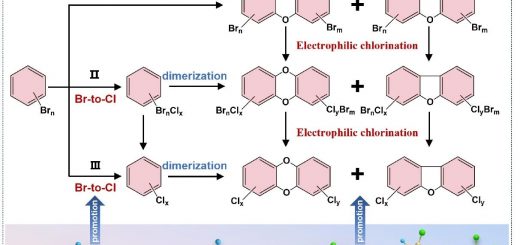北京市PM2.5中多卤代咔唑的赋存及潜在来源

北京市PM2.5中多卤代咔唑的赋存及潜在来源
PM2.5-bound polyhalogenated carbazoles (PHCZs) in urban Beijing, China: Occurrence and the source implication
Peijie Zuo, Chu Wang, Zengwei Li, Dawei Lu, Hao Xian, Huili Lu, Yin Dong*, Ruiqiang Yang, Yingming Li, Zhiguo Pei, Qinghua Zhang*
https://doi.org/10.1016/j.jes.2022.10.048
摘要
多卤代咔唑(PHCZs)因其毒性和广泛的环境分布,最近引起了许多关注。然而,其在大气环境中的赋存及潜在来源我们还知之甚少。本研究中,我们建立了一种基于GC-MS/MS的分析方法,并测定了北京城区PM2.5中的11种PHCZs单体。优化后的方法具有较低的定量限(1.45-7.39 fg/m3)以及较好的回收率(73.4%-109.5%)。应用该方法分析了北京室外的46个PM2.5样品和周边3种焚烧厂(钢铁厂、医疗废物焚烧厂和生活垃圾焚烧厂)的6个飞灰样品中的PHCZs。PM2.5中11种PHCZs含量范围为0.117-5.54 pg/m3(中位数为1.18 pg/m3)。其中,3-氯-9氢-咔唑(3-CCZ)、3-溴-9氢-咔唑(3-BCZ)和3,6-二氯-9氢-咔唑(36-CCZ)是主要化合物,占93%。3-CCZ和3-BCZ在冬季明显较高,由于冬季PM2.5浓度较高;而36-CCZ在春季较高,这可能与表层土壤的再悬浮有关。此外,飞灰中11种PHCZs含量为338-6101 pg/g。飞灰中3-CCZ、3-BCZ和36-CCZ占86.0%。飞灰和PM2.5中PHCZs的同系物特征高度相似,表明燃烧过程可能是大气环境中PHCZs的重要来源。据我们所知,这是第一篇有关室外PM2.5中PHCZs赋存的研究
亮点
针对二噁英类似物多卤代咔唑,建立了一种高灵敏度、节省溶剂的分析方法,首次发现室外PM2.5中多卤代咔唑的赋存状态,并揭示燃烧过程是其重要来源。

Abstract
Polyhalogenated carbazoles (PHCZs) are recently raising much attention due to their toxicity and ubiquitous environmental distribution. However, little knowledge is known about their ambient occurrences and the potential source. In this study, we developed an analytical method based on GC-MS/MS to simultaneously determine 11 PHCZs in PM2.5 from urban Beijing, China. The optimized method provided low method limit of quantifications (MLOQs, 1.45–7.39 fg/m3) and satisfied recoveries (73.4%–109.5%). This method was applied to analyze the PHCZs in the outdoor PM2.5 (n = 46) and fly ash (n = 6) collected from 3 kinds of surrounding incinerator plants (steel plant, medical waste incinerator and domestic waste incinerator). The levels of ∑11PHCZs in PM2.5 ranged from 0.117 to 5.54 pg/m3 (median 1.18 pg/m3). 3-chloro-9H-carbazole (3-CCZ), 3-bromo-9H-carbazole (3-BCZ), and 3,6-dichloro-9Hcarbazole (36-CCZ) were the dominant compounds, accounting for 93%. 3-CCZ and 3-BCZ were significantly higher in winter due to the high PM2.5 concentration, while 36-CCZ was higher in spring, which may be related to the resuspending of surface soil. Furthermore, the levels of ∑11PHCZs in fly ash ranged from 338 to 6101 pg/g. 3-CCZ, 3-BCZ and 36-CCZ accounted for 86.0%. The congener profiles of PHCZs between fly ash and PM2.5 were highly similar, indicating that combustion process could be an important source of ambient PHCZs. To the best of our knowledge, this is the first research providing the occurrences of PHCZs in outdoor PM2.5.
作者简介
第一作者
左培杰 博士于2022年在中国科学院生态环境研究中心获得博士学位。主要从事PM2.5的采样技术、质谱分析方法,应用同位素、PMF方法进行源解析,以及持久性有机污染物(POPs)的环境行为及来源等相关研究。以第一作者在Environ. Sci. Technol.、J. Environ. Sci.等国内外学术期刊发表论文6篇,申请发明专利1项。
通讯作者
张庆华,中国科学院生态环境研究中心研究员,博士生导师。主要从事持久性有机污染物(POPs)的分析方法学、环境地球化学过程及其暴露与健康研究。发表SCI论文150余篇。
原文链接
https://www.sciencedirect.com/science/article/pii/S1001074222005496
引用格式
Peijie Zuo, Chu Wang, Zengwei Li, Dawei Lu, Hao Xian, Huili Lu, Yin Dong, Ruiqiang Yang, Yingming Li, Zhiguo Pei, Qinghua Zhang, 2023. PM2.5-bound polyhalogenated carbazoles (PHCZs) in urban Beijing, China: Occurrence and the source implication. J. Environ. Sci. 131, 59-67.








